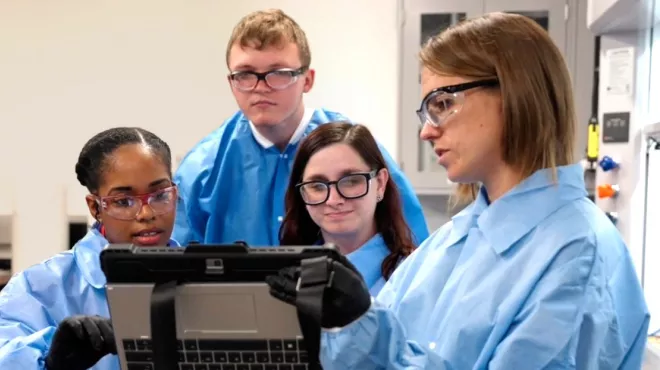For the past four years, the cancer research community has been acting on an accumulation of evidence suggesting that hard-to-treat tumors driven by mutations in a gene called KRAS have an Achilles’ heel. While KRAS itself seemed undruggable, these tumors appeared to be addicted to autophagy, a cellular recycling system that helps cells be thrifty in times of stress and starvation. The field had latched on to the idea that KRAS-mutant tumors could be shut down by inhibiting autophagy and researchers had begun acting on it, hoping to find new therapies for pancreatic cancer and other pernicious diseases.
The flurry of activity spurred by this idea, however, may be coming to a halt based on new findings from the Novartis Institutes for BioMedical Research (NIBR), and also, coincidentally, from Pfizer. Two independent industry labs found evidence that casts doubt on the hypothesis that autophagy inhibitors will shut down KRAS-driven tumors.
“The idea had become dogma in the field,” says Leon Murphy, a director in the Developmental and Molecular Pathways group at NIBR. “But in every case we probed, we found that the hypothesis was not valid.”
After a chance encounter at a conference led the industry researchers to learn of one another’s work, they joined forces to bring their data to light by publishing a paper together in the Proceedings of the National Academy of Sciences. The paper is unusual because results that de-validate hypotheses often go unpublished.
“Jointly we have accumulated an enormous amount of negative validation data,” says Murphy. “We feel it’s important to release these data so that the community will not go off in the wrong direction and invest in areas that aren’t likely to lead to the development of a therapeutic.”
The need for new therapies for KRAS-driven tumors is strong. Approximately 90 percent of pancreatic cancer tumors involve KRAS mutations, and only 5 to 15 percent of patients survive the disease. 1So far, there are no approved drugs that inhibit mutant KRAS and there are no obvious ways to interfere with the mutant protein’s action.
“The idea of attacking KRAS-driven tumors by shutting down autophagy was super attractive,” says Beat Nyfeler, a NIBR investigator and autophagy expert who led the Novartis investigation. “An autophagy inhibitor would have met a huge unmet medical need.”
Gathering evidence
Acting on this potential, the team at NIBR screened a collection of 47 cell lines, including some with cancer-causing KRAS mutations and some with healthy (i.e., wildtype) KRAS. They used RNA interference to disable different components of autophagy. What they found was striking: Disabling autophagy had no effect on growth across all 47 cell lines.
In parallel, Christina Eng, a principal scientist at Pfizer and also an autophagy expert, had become interested in inhibiting autophagy to treat KRAS-driven tumors. “The first step is trying to validate the hypothesis,” she says. “But we couldn’t.”
Chance brought Eng and Nyfeler to the Keystone Autophagy Meeting in Austin, Texas in the spring of 2014. Eng sought out Nyfeler to say hello. She soon learned that they both would be presenting findings refuting the autophagy hypothesis.
“It was shocking,” says Eng. “But what was really beautiful was that it was a perfect complement of tests. He used one set of models, and I used another, but the data were identical.”
Nyfeler followed the screening experiment with another in which he used genome editing technology to delete autophagy in the cultured cell lines. Again he found no effects on cell growth. He ran the test again, this time growing the cancer cells in mice rather than in plastic dishes. The results remained the same.
At Pfizer, Eng had performed the same experiments, targeting the same genes contributing to autophagy. She, too, started in cultured cells and then moved to mouse models and consistently found no effects on growth.
A missing mechanism
The researchers also made an important discovery about the anti-malarial drug chloroquine. Recent research suggests that chloroquine might also work against cancer, ostensibly by inhibiting autophagy, and clinical trials are currently underway to test this hypothesis. But the Novartis-Pfizer team showed that chloroquine slows growth equally in cells whether autophagy is working or has been disabled. “Chloroquine does block autophagy, and it does inhibit cell proliferation, but these things have nothing to do with one another,” says Nyfeler.
The findings do not rule out chloroquine as a promising drug for use in combination with other therapies for cancer, says Eng. “But we need to focus on the mechanism by which it’s actually inhibiting the growth of those tumor cells, and it’s not through autophagy.”
Labs currently acting on the hypothesis that KRAS-mutant tumors are addicted to autophagy and vulnerable to its inhibition may need to re-evaluate this strategy given these findings. “That’s the point,” says Murphy. “Hopefully this will allow researchers to focus on finding different ways that autophagy is important in cancer.”



